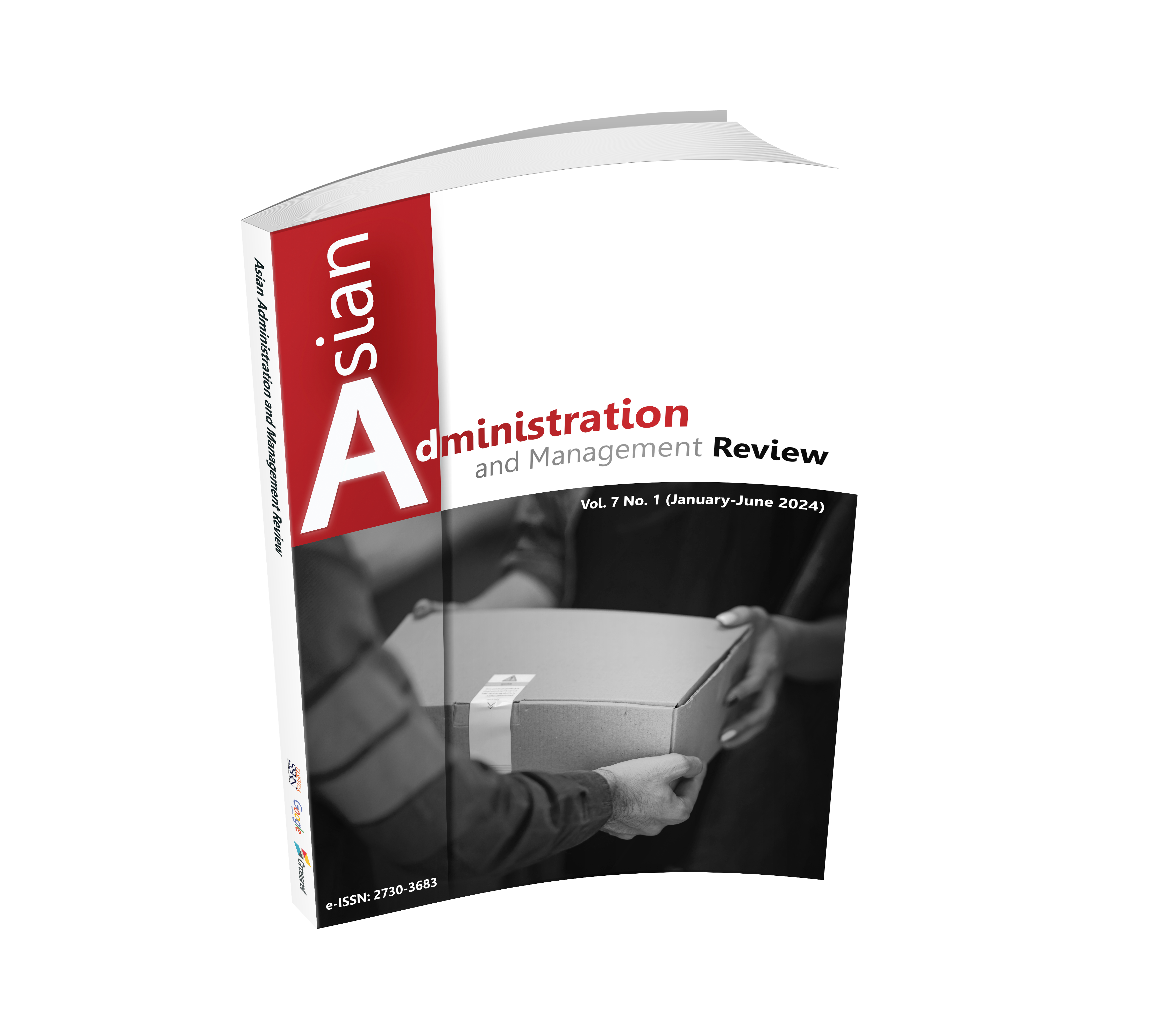THE POWER OF STRATEGIC MANAGEMENT ACCOUNTING FOR ENHANCING PERFORMANCE EFFICIENCY OF THE FOOD INDUSTRY
DOI:
https://doi.org/10.14456/aamr.2024.9Keywords:
Strategic Management Accounting, Operational Efficiency, Food IndustryAbstract
This research aims to study the power of strategic management accounting for enhancing performance efficiency of the food industry in the Thailand’s three southern border provinces. The study included a population group of 151 restaurant businesses. Data was collected through a questionnaire and semi-structured interviews, and analyzed using descriptive analysis, structural equation modeling, and content analysis. The research result reveals that the food industry holds a moderate level of opinion regarding the effectiveness of strategic management accounting on the industry's performance. In terms of the performance process, both the effectiveness and efficiency of the food industry, encompassing non-financial and financial aspects, reached a high level. Performance was assessed based on factors such as cost, the freshness of materials, timely and regular customer response, analysis of rivals' strengths in various aspects, and emphasis on service. Furthermore, the Casual Model developed to measure the impact of strategic management accounting on the food industry's performance effectiveness aligns with empirical data and confirms the hypotheses for all items.
Downloads
References
Abdelraheem, A., Serajeldin, B., & Jedo, A. (2017). Strategic Cost and Activating Competitive Advantage. International Journal of Trend in Scientific Research and Development, 1(4), 337-342.
Ahmad, K., & Zabri, S. (2016). Management Accounting Practices among Small and Medium Enterprises. A paper presented at the 28th International Business Information Management Association Conference, Seville, Spain.
Bowman, E., & Haire, M. (1975). A Strategic Posture toward Corporate Social Responsibility. California Management Review, 18(2), 49-58.
Bromwich, M. (1990). The Case for Strategic Management Accounting: The Role of Accounting Information for Strategy in Competitive Markets. Accounting, Organizations and Society, 15(1-2), 27-46.
Cadez, S., & Guilding, C. (2008). An exploratory investigation of an integrated contingency model of strategic management accounting. Accounting, Organizations and Society, 33(7-8), 836-863.
Chen, R., & Wong, K. (2004). The Determinants of Financial Health of Asian Insurance Companies. The Journal of Risk and Insurance, 71(3), 469-499.
Cinquini, L., & Tenucci, A. (2010). Strategic Management Accounting and Business Strategy: A Loose Coupling?. Journal of Accounting & Organizational Change, 6(2), 228-259.
Clarkson, P., Li, Y., Richardson, G., & Vasvari, F. (2008). Revisiting the relation between environmental performance and environmental disclosure: An empirical analysis. Accounting, Organizations and Society, 33(4-5), 303-327.
Efinancethai. (2020). How much does COVID-19 affect business and labor?. Retrieved from www.efinancethai.com/efinReview/efinReviewMain.aspx?release=y&name=er_202006111501&fbclid=IwAR1KVc7eInEiac2igQT1HctKMxR6DqErb0PBy6x60ZVDgmqNU8FaOKYV1U.
Gosselin, M. (2011). Contextual factors affecting the deployment of innovative performance measurement systems. Journal of Applied Accounting Research, 12(3), 260-277.
Hair, J., Black, W., Babin, B., & Anderson, R. (2010). Multivariate Data Analysis. 7th ed. New York: Pearson.
Jusoh, R. (2008). Environmental Uncertainty, Performance, and the Mediating Role of Balanced Scorecard Measures Use: Evidence from Malaysia. International Review of Business Research, 4(2), 116-135.
Kotane, I., & Kuzmina-Merlino, I. (2012). Assessment of Financial Indicators for Evaluation of Business Performance. European Integration Studies, 6, 216-224.
Limchaicharoen, P. (2017). Relationship between Factors Affected the Strategic Management Accounting Usage for Success of Organizational Empirical Investigation of Food and Beverages Corporation in Thailand. RMUTT Global Business and Economics Review, 12(1), 61-74.
Nixon, B., & Burns, J. (2012). The paradox of strategic management accounting. Management Accounting Research, 23(4), 229-244.
Olve, N., Roy, J., & Wetter, M. (1999). Performance Drivers: A Practical Guide to Using the Balanced Scorecard. New York: Wiley.
Phama, T., & Phan, T. (2020). How to improve financial performance of tourism and travel enterprises: The case of Vietnam. Accounting, 6, 335-344.
Roslender, R., & Hart, S. (2002). Integrating Management Accounting and Marketing in the Pursuit of Competitive Advantage: The Case for Strategic Management Accounting. Critical Perspectives on Accounting, 13(2), 255-277.
Santos, J., & Brito, L. (2012). Toward a Subjective Measurement Model for Firm Performance. Brazilian Administration Review, 9(Special Issue), 95-117.
Schulz, A., Wu, A., & Chow, C. (2010). Environmental Uncertainty, Comprehensive Performance Measurement Systems, Performance-Based Compensation, and Organizational Performance. Asia-Pacific Journal of Accounting & Economics, 17(1), 17-39.
Simmonds, K. (1981). Strategic Management Accounting. Management Accounting, 59(4), 26-29.
ThaiMallPlaza. (2020). List of Food Industry Limited Companies. Retrieved from www.thaimallplaza.com/.
Thapayom, A. (2019). Strategic Management Accounting Techniques and Organizational Sustainable Performance: Evidence from Industrial Estates in Rayong Area, Thailand. Journal of Modern Management Science, 12(1), 51-74.
World Bank. (2020). World Development Report 2020. Retrieved from www.worldbank.org/en/publication/wdr2020.
World Health Organization. (2020). The top 10 causes of death. Retrieved from https://www.who.int/news-room/fact-sheets/detail/the-top-10-causes-of-death.

Downloads
Published
How to Cite
Issue
Section
License
Copyright (c) 2023 Authors

This work is licensed under a Creative Commons Attribution-NonCommercial-NoDerivatives 4.0 International License.











.png)


